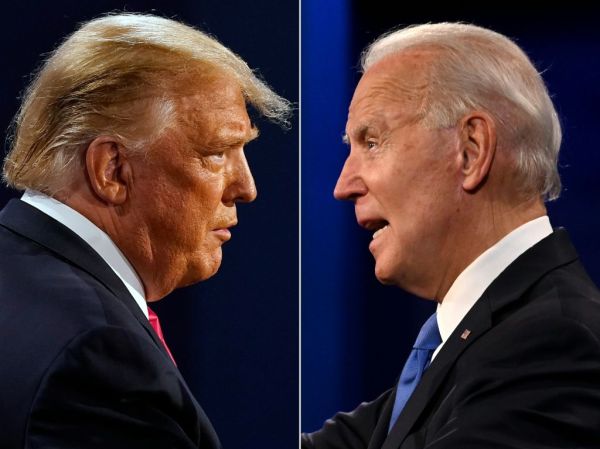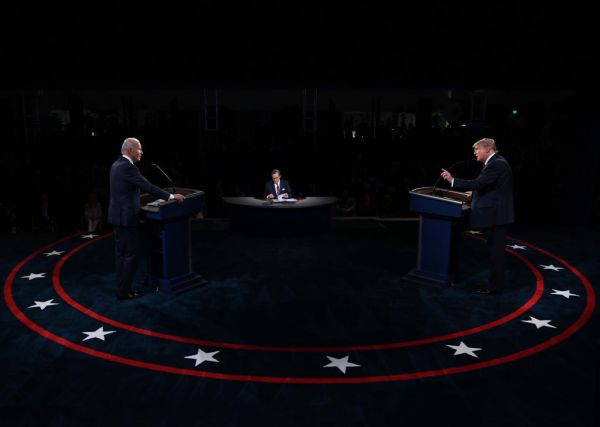Hello and happy Saturday. That’s right—Saturday. We’ve been sending this newsletter on Sunday for a while now, but we are shifting back to Saturdays to free up time for you to read our new newsletter, Dispatch Faith, which makes its debut tomorrow. Read about it here and sign up to get it here.
Writing this week’s newsletter presented an interesting challenge. I was out on a family trip to Massachusetts through Wednesday, which means I was coming to many of our articles and newsletters with fresh eyes, no different from all of you. And, boy, was that a lot of reading. (I think I still have a few editions of Boiling Frogs to catch up on—Nick does write every day, after all.)
One bit of news I missed (though that depends on how you define missed) while we were watching whales and eating lobster was Donald Trump’s suggestion that he would replace income taxes with tariffs. The proposal is probably among the most unserious ideas that the former president has put forth—and this is a pretty high bar—but it’s one that warrants a serious response. Fortunately, Scott and Kevin were on the case.
In Capitolism (🔒), Scott jumps right in and calls the idea “dangerously foolish” and “unicorn math.” Last year, the government spent $6.1 trillion and raised just $4.4 trillion. Meanwhile, we imported $3.8 trillion in goods and services. You don’t need to be a math major to see the problem there: As Scott notes, “the federal government would need to impose a tariff on all imports of goods and services of around 160 percent to cover current spending and 116 percent to replace just revenues.”
But those figures represent an imaginary world where there are no behavioral changes as a result of the tariffs. And as he writes, there would indeed be changes: Americans would “import less because imports cost more. … Fewer imports would mean a smaller tax base, which in turn would mean you’d need even higher tariffs to raise the same amount of revenue. But if you raise tariffs too high, you get no imports at all—and thus no revenue. Oops!”
While Kevin isn’t too too worried that the scenario would come to pass if Trump wins in November—“he has rarely seriously pursued substantive policy ideas that would require persuading Congress to act,” he takes issue with Republican National Committee spokeswoman Anna Kelly, who claimed that, “The notion that tariffs are a tax on U.S. consumers is a lie pushed by outsourcers and the Chinese Communist Party.”
Nope, Kevin argues. It’s Kelly who’s lying, and actually “tariffs are paid directly by U.S. firms and U.S. persons—they are a tax imposed on importers domiciled in the United States, not a tax imposed on foreign manufacturers.” But it goes beyond that: “When you raise the price of competitors’ goods, domestic producers do not keep their own prices down out of the goodness of their hearts,” so Americans would feel even more economic pain.” In a separate piece, Kevin offers his own radical suggestion—unilateral free trade.
A lot more happened this week besides bad ideas based on bad math. Check out some things you might have missed. And thanks, as always, for reading.
On a trip to the front lines in Kharkiv Oblast, Joseph Roche finds a group of soldiers managing to maintain their optimism, and even a sense of humor, amid the loss and uncertainty of war. Russia’s offensive in Kharkiv is widely seen as a failure—and one soldier thinks he knows why. Viatcheslav, the brigade commander, tells Joseph: “We know why we’re fighting. In contrast, when we capture Russians, we see that they are neither prepared nor motivated. To me, they don’t stand a chance against us.” To be fair, they also acknowledge the Western weapons that have aided their fight. And it’s not all good news: Joseph spent time with a drone operator named Hamlet, who died on a mission just a few days later. But he also talks to a woman named Oleksandra who jokes that she’s become the brigade’s psychologist because the men have trouble talking. He also watches as soldiers laugh around a grill while cooking dinner. “We don’t know if we’ll still be alive next week, so we live as if there’s no tomorrow,” a soldier named Serhii explains.
All is not quiet on the northern front in Israel. Tens of thousands Israelis have had to evacuate, and a similar number of Lebanese citizens have had to leave their own homes in southern Lebanon because of ongoing clashes between Hezbollah and Israeli Defense Forces. “The Middle East is on the precipice of the most destructive war of the region’s modern history,” David Daoud and Jonathan Schanzer write. Hezbollah is more powerful than Hamas, and the displacement of Israeli citizens is “an unacceptable situation for Israelis across the political spectrum, and the public is demanding decisive action from the government to resolve this threat.” Daoud and Schanzer run through the various factors impeding any efforts to avoid a full-scale war, from failures of international diplomacy to the fact that Lebanon is a failed state. They write: “Meanwhile, the international community’s fixation on futile deals has only whetted Hezbollah’s appetite for violence.”
I really try not to play favorites in this newsletter—I want to make sure you’re seeing a wide range of what we publish. But Kevin was on fire this week. As worked up as he was about tariffs, he reserved most of his ire for Aaron Dimmock, a “pro-Trump conservative” who’s challenging Florida Rep. Matt Gaetz in the Republican primary on August 20. Dimmock is a retired naval aviator who’s become a human resources consultant touting the virtues of “radical candor.” So Kevin reached out and asked Dimmock a simple question: Why run against one dishonest and dishonorable man just to do the bidding of a different dishonest and dishonorable man? Dimmock offered only a boilerplate defense of Trump being targeted by a politically motivated prosecutor and repeated his answer when Kevin pressed him. He writes “Good luck, Aaron Dimmock, ‘radical candor coach’—coach!—and gormless Trump sycophant. … It isn’t easy ending up the weasel in a story in which Matt Gaetz figures prominently.” (There’s a lot more, but we try to keep this newsletter PG-13.)
And here’s the best of the rest:
- In Vidal v. Elster, the Supreme Court ruled that the Patent and Trade office can refuse to trademark slogans or phrases that contain the name of a “particular living individual.” Charles Miller writes that while the decision was kind of a mess despite being unanimous—there were four separate opinions citing different reasoning—it was a victory for political speech.
- The Heritage Foundation paints a gloomy picture on the state of our military in its latest Index of U.S. military strength. Bret Devereaux notes that the “overall structure of the Index is designed to project an impression of weakness” but that “underlying these slanted assessments is an astoundingly inconsistent analysis.”
- Journalist Abdallah Aljamal was killed during Israel’s incursion into Gaza to rescue four hostages earlier this month—because he was one of the captors. Charlotte reports about his ties to an anti-Israel publication that is based in the United States and notes that the incident “may be indicative of a larger problem: Hamas’ weaponization of the press and the role of journalists as both witting and unwitting accomplices.”
- The Dispatch Politics team reports on a super PAC that is trying to make up for the Trump campaign’s lack of a ground game. The Republican Leadership Fund plans to deploy about 100 staffers to target non-partisan voters in Nevada—and perhaps other battleground states. Why Nevada? The state automatically registers people to vote through the Department of Motor Vehicles, its independent voters outnumber the totals for either party, and Democrats’ historic advantage is slipping.
- What happened to RFK Jr.? Why can’t a third-party candidate with significant name recognition make headway in a race between two extremely unpopular candidates? Nick can think of a few reasons, which he discusses in Boiling Frogs.
- And the pods! Are you looking forward to next week’s debate between Biden and Trump? Neither is The Dispatch Podcast crew. Tune in to see why they suggest watching it on mute. You’ll be reading a lot about the Supreme Court for the rest of the month as court watchers wait for the major decisions from the term. On Advisory Opinions, Sarah and David French discuss how the Supreme Court is more complex and restrained than the media would have you believe, and they also talk about one of those big decisions, United States v. Rahimi. To catch up on what’s going on with British politics, anti-Israel protests in the U.K., and the war in Ukraine, check out Jonah’s Remnant interview with Francis Dearnley, an editor at The Telegraph and host of the paper’s Ukraine podcast.







Please note that we at The Dispatch hold ourselves, our work, and our commenters to a higher standard than other places on the internet. We welcome comments that foster genuine debate or discussion—including comments critical of us or our work—but responses that include ad hominem attacks on fellow Dispatch members or are intended to stoke fear and anger may be moderated.
With your membership, you only have the ability to comment on The Morning Dispatch articles. Consider upgrading to join the conversation everywhere.